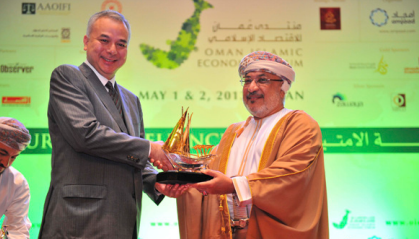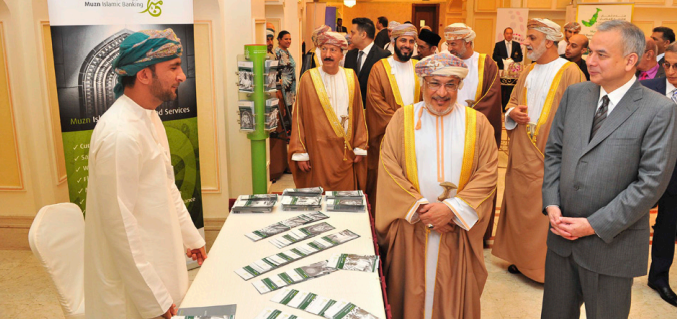The Sultanate of Oman witnessed another milestone event in the history of Islamic banking and finance in the country with the hosting of the second Oman Islamic Economic Forum (OIEF) held at Al Bustan Palace on May 1-2, 2013. The two-day conference celebrates the recent Royal decree announced in December 2012 which allowed Islamic banks to start their operations. Bank Nizwa and Al Izz Islamic Bank, the two fully-fledged Islamic banks have already completed their Initial Public Offerings (IPO’s). Bank Nizwa and a number of Islamic windows have already started their Islamic banking operations. Suleiman bin Hamad Al Harthy, GM of Islamic Banking at Bank Muscat Meethaq, and one of the speakers, ventured that the OIEF is very important for the Islamic banking industry, which is still in its early stages. This requires us to keep pace with the development in this sector in the world.



The Forum was opened by His Excellency Dr Yahya Bin Mahfoud Al-Mantri, Chairman of the State Council. His Royal Highness Raja Dr. Nazrin Shah, Crown Prince of State of Perak and Financial Ambassador of Malaysian International Islamic Finance Centre (MIFC), was a special guest and delivered a keynote speech. He informed the audience that 2013 was the 30th year of official diplomatic relations between Oman and Malaysia. Bilateral relations between the two countries have benefited both countries in key areas including education, culture, business and trade. Trade between Malaysia and Oman reached USD 750 million in 2011, a substantial increase from USD 265 million in 2010. HRH highlighted the potential of Oman and Malaysia to continue their successful partnership and mutually benefiting from their collective resources. Accordingly, such relationships are beneficial for global development and product innovation, and will help address wider global issues facing the Islamic banking and finance industry. He suggested a potential area of collaboration can be the development of human capital. This is because the strong growth of the Islamic banking and finance industry has put pressure on the availability of suitably qualified professionals, especially those who are both conventionally and Islamically trained, and understand the Shari’a implications of financial transactions. He mentioned that the approach and commitment of the government of Oman towards developing a vibrant Islamic finance industry is very similar to the experience of Malaysia when the Islamic Banking Act was passed in 1983, followed by the opening of the first fully-fledged Islamic bank, Bank Islam. Focusing on the Malaysian Islamic finance sector, HRH Raja Nazrin Shah noted that Malaysia has taken an approach that places Islamic finance at par with its conventional counterpart. In the areas of regulation and supervision, the overall philosophy is to ensure investors and consumers of Islamic financial products and services enjoy the same level of protection, clarity, consistency, governance and other best practices.
The financial market regulators of both countries enjoy a cordial relationship and in September 2011 a senior delegation from the Capital Markets Authority of Oman visited Malaysia and met representatives of the Securities Commission and other important stakeholders to discuss issues relating to regulatory developments. Oman and Malaysia can work together to develop human resources for the Islamic banking and finance industry. In this regard, Malaysia has established a number of institutions with the primary aim of training Islamic finance professionals. These are the International Centre for Education in Islamic Finance (INCEIF), the Islamic Banking and Finance Institute Malaysia (IBFIM) and the Securities Industry Development Corporation (SIDC). HRH stated that by leveraging on these institutions, Oman and Malaysia can embark on joint initiatives to develop a pool of professionals to drive innovation and growth of the Islamic finance industry. Lastly, HRH expressed confidence and optimism about the growth of Islamic banking in the country. The Executive President of Central Bank of Oman, Hamood Sangour Al Zadjali concurred pointing out that the local market is expecting the Islamic banks to stimulate the country’s only report on Islamic banking and finance industry which looks at the industry from a global perspective. GIFR already has the crown of being the best research and development publication in Islamic finance, according to the World Donor’s Forum 2012. H.E. Dr Yayya Bin Mafodh Al Manthri, Chairman of the State Council was also presented with a copy of the report.

Professor Dar further mentioned “The Global Islamic Finance Report 2013 estimates the size of the global Islamic financial services industry in excess of USD1.6 trillion, with an average annual growth rate of 18% observed worldwide. While conventional banking and finance has been halted by the market economy as well as providing financial support to the SME sector in Oman.
HRH Raja Dr, Nazrin Shah also informed the audience of developments in the Islamic capital markets in Malaysia. He began with a brief history highlighting the first Malaysian corporate sukuk in 1990 by a Malaysian subsidiary of Shell Group, the launch of the first Shari’a-compliant-unit trust fund in 1993 and the introduction of a screening methodology of Shari’a-compliant stocks in 1997. In giving an overall progress report of the industry in Malaysia HRH Raja Nazrin Shah stated Malaysian Islamic banking assets in the country reached USD164.9 billion in December 2012 with an average growth of 18- 20 percent annually. Dr Nazrin Shah believes that the Islamic banking and finance industry will reach USD1.8 trillion by 2016, which will parallel the acceleration of Islamic capital markets activities including cross-border activities. Malaysia’s commitment towards global Islamic finance is reflected in part through the implementation of the Malaysia International Islamic Financial Centre which aims to position Malaysia as an international hub for Islamic finance activities.
Khalid Hilal Alyahmadi, Founder OIEF, in his opening speech highlighted the need of an alternative financial system. “As the global economy continues to struggle amid one of the worst financial crises in recent history, the call for an alternative way of conducting financial activity has progressively become louder. In an interconnected world, the financial markets have somewhat become an international casino for the elite, where millions are made and lost in a zero-sum game, paying less attention to the disastrous effects these speculative activities have on society”. He proposed a return to the ethical principles of the Glorious Quran and Sunnah which have much to offer to form a just society. Over the past few decades, Shari’a principles have been re-examined and reapplied in the context of the contemporary Islamic finance industry which has experienced a phenomenal growth as a result.

The annual Global Islamic Finance Report (GIFR) 2013, which is now in its fourth year of publication, was launched at the occasion. HRH Raja Dr Nazrin Shah, who wrote the foreword for the 2013 issue of the report, was formally presented with the Report. The Report was presented by H.E. Shahid Malik, Former UK Minister for International Development and Chairman of the International Advisory board of GIFR. Professor Humayon Dar, Chairman Edbiz Corporation, explained the aims and objectives of the report and how it is benefitting the wider Islamic banking and finance industry globally. “GIFR is for the industry, by the industry, to the industry. In the last four years the report has been resoundingly successful: it is the disturbances in the last 5 to 7 years, Islamic banking and finance has shown resilience and has managed to come out of the current financial crisis even stronger and more significant. New markets are being explored and developed to ensure that Islamic banking and finance is not just a GCC and Malaysian phenomenon. The financial institutions from the Gulf have played a pioneering role in acquiring financial institutions in Egypt, Jordan and Sudan to convert them into Islamic banks, which is helping Islamic banks and financial institutions to develop themselves into global financial players. Investors from the GCC have set up Islamic banks and financial institutions in European countries, notably UK, and other continents of Africa and Asia. Consequently, we have now Gulf-owned Islamic banks in UK, Bosnia Herzegovina, Singapore and Kenya and many other countries around the world”.
H.E. Shahid Malik also delivered a keynote speech at the forum where he highlighted the role of UK in international development and internationalising Islamic banking and finance. He explicated the achievements of the UK government in introducing Islamic finance by amending regulations and encouraging investment.
Dr Khalid Al-Fakih, General Secretary Accounting and Auditing Organization for Islamic Financial Institutions (AAOIFI), presented on “Governance Issues in Islamic Finance” in which he highlighted the need for effective internal controls in an organization. AAOIFI have until now issued 88 standards of which 48 are Shari’a standards, 26 are accounting standards, 5 auditing standards, 2 governance standards and 2 code of ethics standards.
Daud Vicary Abdullah, CEO and President of INCEIF presented on “The Future of Islamic Finance” where he highlighted the growth of Islamic banking and finance industry globally and the challenges the industry faces. “As Islamic finance develops stakeholders need to understand the current financial landscape and what is necessary for the present-day Islamic financial services industry.” Highlighting the challenges of this niche industry, Mr Vicary stated that the cost of developing Shari’a-compliant instruments is high, monetary policies are tilted in favour of conventional banking and finance system, and there is a lack of Shari’a-compliant instruments in risk and liquidity management. He argued for a return to equity-based financing and risk sharing, building Islamic microfinance, and lobbying for legal and monetary policy changes. “It is expedient to develop policies that are beneficial for players in Islamic finance to compete on level playing field and move away from a debt-based system to more equity-based,” he stressed. The need for talent development, building high-quality educational systems and professional standards were also highlighted.

Professor Volker Nienhaus, an adjunct professor at INCEIF and visiting professor at Henley Business School presented on the “Islamic Finance Regulation: Response to Basel III” where he highlighted the new features introduced by Basel III and its impact on Islamic banks.
Another important presentation was by Khalid Yousaf, Director Islamic Advisory at KPMG, on the interplay between equity and debt in liquidity management, with a focus was on Oman and the options available for liquidity management for Islamic banks. Khalid Yousaf highlighted the intraday credit facility extended by Central Bank of Oman (CBO) to Real Time Gross Settlement (RTGS) members for a period less than one day. Members may use the facility by pledging securities in their collateral account. There is no cost involved in the transaction apart from small administrative charges. Standing facility is also available for institutions. There is no limit to the funding amount as long as there is underlying collateral. He further stated the challenges and implications of deposit instruments and securities instruments. Different options available for Islamic banks were highlighted including, wadiah yad dhaman (custody with guarantee), commodity murabaha programmes, sukuk al ijara, sukuk al murabaha, sell and buy back agreements, intraday credit trading houses and exchanges were also discussed.
Dr Amat Taap Manshor, CEO of Finance Accreditation Agency (FAA) – an independent and international quality assurance and accreditation body supported by Bank Negara Malaysia and Securities Commission Malaysia – also emphasised talent development in Islamic finance and raising standards of training and education programmes. FAA aims to address the following concerns: Insufficient supply of high-quality talent in Islamic finance, lack of benchmarked standards for Islamic finance education and training, unavailability of an international accreditation body for Islamic finance and absence of an Islamic finance qualification structure.

Muhammad Nadeem Aslam, Head of Islamic Finance at Meethaq spoke on the potential of Sukuk market in Oman and highlighted global developments in the sukuk industry and how Oman can benefit from it.
In addition, there were a number of other panel discussions on critical issues facing Islamic banking and finance industry including on Islamic capital markers, structuring Islamic financial products, and venture capital and SMEs. Other panel discussions were on Shari’a issues in Islamic finance, takaful prospects in GCC, the role of zakat, waqf and charity in building an alternative Islamic economic system, leveraging the power of Islamic finance in reducing poverty and the interplay between education, technology and moral behaviour, where a number of important issues and developments were discussed. In total there were more than 30 speakers including, leading practitioners, bankers, academicians, economists, takaful providers, lawyers, advisors and Shari’a scholars. Attendees included senior government representatives from Oman and wider GCC, practitioners, bankers, students and others.
A number of collaborations were officially formalised during the course of the two-day event. One of these included, Amjaad Developments signing a deal with Meethaq Islamic Banking Group where Amjaad Group will design and construct all the Islamic banking branches for Meethaq.




